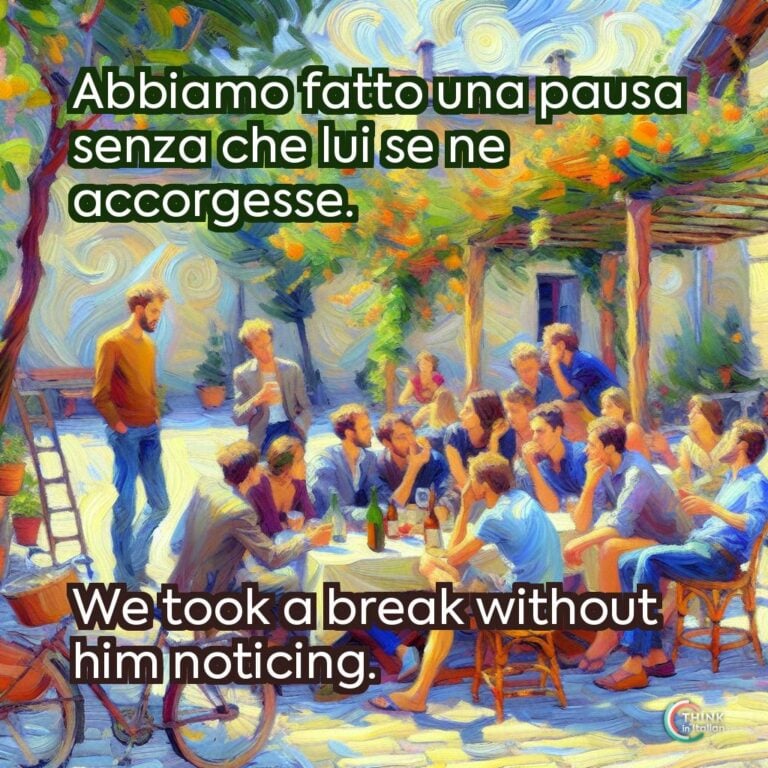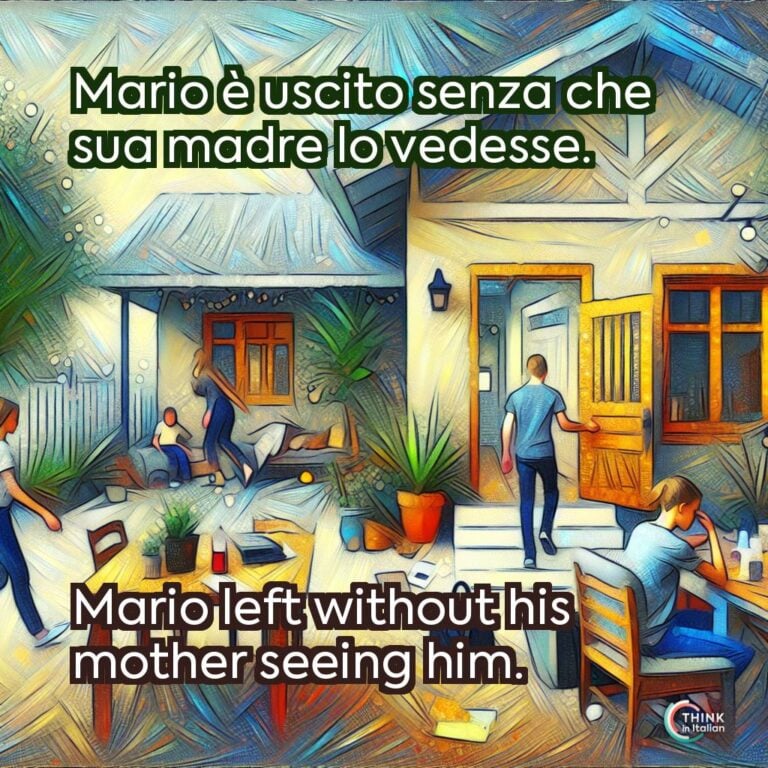What does senza che mean in Italian?
To understand today’s lesson, have a look at the sentence: She walked past without them noticing her.
As you can see in the example above, in English, we used the following structure:without + noun or pronoun (them) + verb ending in -ing (noticing)
Here’s the Italian translation: È passata davanti a loro senza che la vedessero.
Here, senza che + verb is the equivalent of the English structure we gave you above.
How to use senza che with the subjunctive?
Read the following sentence:
Devi fare domanda senza che lui lo sappia.
You should apply without him knowing.
You might not have noticed it, but sappia is in the present subjunctive.
Here’s the complete structure: senza che + pronoun or noun + subjunctive. The subjunctive can either be
- present if we’re talking about an event in the present or the future.
- imperfect if we’re talking about an event in the past.
Let’s review some examples:
- senza che + pronoun or noun + present subjunctive
Anna vuole uscire senza che Marco lo sappia.
Anna wants to go out without Marco knowing.
- senza che + pronoun or noun + imperfect subjunctive
Anna voleva uscire senza che Marco lo sapesse.
Anna wanted to go out without Marco knowing.
However, the following structure…
- senza che + pronoun or noun + present or imperfect subjunctive
…is the equivalent of…
- without + pronoun or noun + verb in -ing
Here’s one more example for you to understand better:
Dimmelo senza che lei ci ascolti.
Tell me without her listening.
Why do we say senza che with the subjunctive?
You might be wondering why we don’t just say senza and that’s it. It’s not because we like to make things complicated.
The reason is we use senza che + subjunctive only when the subjects of the two connected clauses are different.
Let’s have a look at the sentence we saw above one more time:
Dimmelo senza che lei ci ascolti.
Tell me without her listening.
As you can see, we have two subjects: one is tu (you, as in you tell me) and the other one is lei (her, as in her listening).
Since we have two different subjects, we must use this structure with the subjunctive.
Italian subjunctive: present and imperfect
In order to form the congiuntivo presente of regular verbs in Italian, you basically have to keep the root of the verb in the present of the indicative and add the correct endings:
| parlare | vedere | partire | |
| io | parli | veda | parta |
| tu | parli | veda | parta |
| lui/lei | parli | veda | parta |
| noi | parliamo | vediamo | partiamo |
| voi | parliate | vediate | partiate |
| loro | parlino | vedano | partano |
Here’s the present subjunctive of three of the most common irregular verbs:
| essere | avere | fare | |
| io | sia | abbia | faccia |
| tu | sia | abbia | faccia |
| lui / lei | sia | abbia | faccia |
| noi | siamo | abbiamo | facciamo |
| voi | siate | abbiate | facciate |
| loro | siano | abbiano | facciano |
As for the Italian congiuntivo imperfetto, most of the verbs are regular.
In order to form the imperfect subjunctive in Italian, you have to remove –are, –ere, and –ire from the infinitive (the base form of the verb) and add the correct endings:
| parlare | vedere | partire | |
| io | parlassi | vedessi | partissi |
| tu | parlassi | vedessi | partissi |
| lui/lei | parlasse | vedesse | partisse |
| noi | parlassimo | vedessimo | partissimo |
| voi | parlaste | vedeste | partiste |
| loro | parlassero | vedessero | partissero |
Here’s the imperfect subjunctive of two of the most common irregular verbs:
| essere | avere | fare | |
| io | fossi | avessi | facessi |
| tu | fossi | avessi | facessi |
| lui / lei | fosse | avesse | facesse |
| noi | fossimo | avessimo | facessimo |
| voi | foste | aveste | faceste |
| loro | fossero | avessero | facessero |
Senza che and subjunctive: examples
Let’s now focus on some examples with senza che with either the present or imperfect subjunctive.
Possiamo seguirli senza che ci vedano.
We can follow them without them seeing us.
Non posso mandare e-mail senza che lui lo sappia.
I can’t send emails without him knowing.
Non possiamo affrontare il problema senza che voi parliate.
We can’t deal with this problem without you speaking.
È partita senza che io lo sapessi.
She left without me realizing it.
È andato via senza che gli altri lo salutassero.
He left without the others saying goodbye to him.
Mi avete rimproverato senza che io potessi giustificarmi.
You blamed me without me being able to justify myself.
Liz ha chiuso la porta senza che loro se ne accorgessero.
Liz closed the door without them realizing it.
Hanno pagato senza che io gli chiedessi.
They paid without me asking them.




